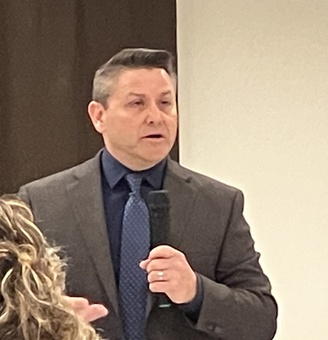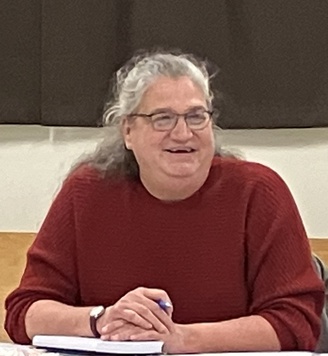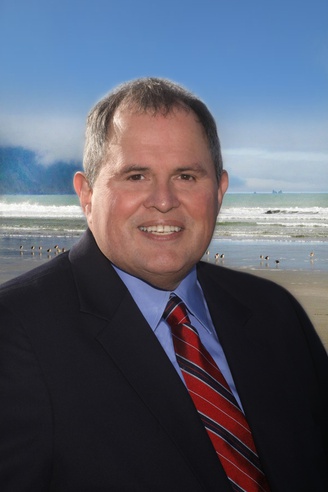Jessica Cejnar Andrews / Monday, Jan. 29, 2024 @ 5:23 p.m. / Community, Elections
Del Norte Supervisor Candidates Discuss Challenges, Tri-Agency, Offshore Wind at Association of Realtors Forum

Rivers Drown
Two out of three incumbents in the Del Norte County supervisor races reintroduced themselves to voters and defended their positions against challengers hoping to unseat them on March 5.
At a candidates forum hosted by the Del Norte Association of Realtors on Friday, District 2 incumbent Valerie Starkey faced her challenger, retired Pelican Bay State Prison corrections officer Rivers Drown. They shared the stage with District 5 incumbent Dean Wilson and his challengers, Linda Sutter, an activist against increased taxes, and Heather Polen, a lifelong Del Norte County resident.

Valerie Starkey
District 1 Supervisor Darrin Short, who is also up for re-election and is running unopposed, did not participate in Friday’s forum, though he was in the audience.
Before launching into the Q&A portion, association director Taudine Andrew explained that the Del Norte Association of Realtors isn’t focused on any particular party.
“The realtor party is not focused on the right, left or even the middle of the aisle,” she said. “It is focused on the issues that matter to existing and future homeowners and the real estate industry.”

Heather Polen
After introducing themselves, candidates opined on the county’s biggest challenges, homelessness, offshore wind power, the Tri-Agency Economic Development Authority and mental health services.
Introductions
The first to speak, Heather Polen, said she got her first job at 15 when Bill Stamps, “our favorite SOB, ‘Sweet Ol’ Bill’” hired her as a DJ on KPOD. She said she spent a week training with Dapper Dutch, who told her about how Stamps helped reunite families and coordinate services in the wake of the 1964 tsunami.

Linda Sutter
Polen said Stamps told her of the things people sacrificed for each other to rebuild Crescent City.
“What amazed me about that, at 15 years old, was when he said it wasn’t just month after month, it was year after year to rebuild our community,” she said. “While we are not in the tsunami crisis of ’64, we do face our own crisis here today and we do need to pull together. We need to, year after year, set our priorities as a community as we did in ’64 and we need to tackle those problems.”

Dean Wilson
Linda Sutter, a 30-year resident of Del Norte County, has been a fixture at Board of Supervisor and Crescent City Council meetings for 16 years. Fighting against increased taxes for about 12 years, Sutter said the Howard Jarvis Taxpayers Association has endorsed her.
“What do we have to show for our taxes?” Sutter asked. “Our roads are crumbling, riddled with potholes the size of Texas, essential services are lacking due to underpaid county workers and law enforcement officers, while county department heads are overpaid.”
Sutter chastised sitting supervisors for “spending our hard-earned tax dollars to attend RCRC [Rural County Representatives of California] meetings” and criticized Wilson for voting against the interest of his constituents.
She also criticized Wilson for his support of the Tri-Agency Economic Development Authority, the joint powers authority she has filed a lawsuit against.
“I stand before you today to pledge my commitment to fighting against unjust taxes and the lack of transparency in our local government,” Sutter said. “When I go to Sacramento, your voices will be heard.”
Wilson was elected to the Board of Supervisors in 2022 following the death of his predecessor, Bob Berkowitz. He’s been serving for just over a year and was appointed as Board chairman earlier this month.
Wilson said he campaigned on the need for Del Norte County to create a strategic plan. He called his elevation to the Board of Supervisors chair just before he and his colleagues directed staff to begin developing such a plan fortuitous.
Del Norte County employs more than 400 people and has a budget of about $200 million, he said, but it lacks a strategic plan.
“If you have a business or even in your home, you have to have an oversight plan on where [you’re] going to go and how [you’re] going to overcome challenges,” he said. “That is how we come together as a community and make that our plan to deal with these challenges. This is something I’ve been pushing for and will come to the forefront during the first three months of this year.
Other goals Wilson said he’s working on is fuel reduction, tackling homelessness and ensuring his constituents continue to have fire insurance.
“I decided to run because I saw many of these things coming and I want to prepare our community that I love and I work so hard for,” he said. “I spent 36 years in government, 12 of those as sheriff of Del Norte County. I know what this community is about and we can beat those challenges together.”
Since first taking her seat in 2021, Starkey said her term has been one of anticipating tough questions, coming to meetings prepared — which includes reading through agenda packets, contacting department heads and speaking with community stakeholders — laying foundations and, finally, taking action.
In 2022, during Berkowitz’s illness, Starkey said she adopted District 5 as her own and, with appointed District 5 Supervisor Susan Masten, created a homelessness ad-hoc committee that has led to a $10.8 million grant win for the county.
“2023 was action. Action propelled me from the realm of ideas to the realm of tangible change,” she said. “It was a year of rolling up my sleeves, getting my hands dirty and making tough decisions that were necessary. We installed street lights, repaired the split stairs [on Pebble Beach], we held open budget meetings and we secured $10 million to finally address homeless issues in ways that have never been accomplished. And our journey is far from over.”
Drown, who blamed his unusual first name on his dad, moved to Crescent City in 1988 as a freshman in high school. In 1992, he graduated, joined the U.S. Navy and married his wife. After spending four years stationed in the Persian Gulf on the U.S.S. Nimitz, he moved back to Crescent City and worked for his father-in-law at Two Guys as a welder.
Drown was then hired at Pelican Bay State Prison where he retired after 25 years as a sergeant last June. He said he was the prison’s first K9 officer and headed its SWAT team, which allowed him to work with the Del Norte County Sheriff’s Office.
“Richard Griffin was on the Drug Task Force at the time, serving over 600 successful search warrants and bringing drugs off the streets and making arrests. Me and my team were able to help him out,” Drown said. “We don’t have a drug task force anymore, folks, and we need to get one because drugs are out of control.”
Drown said he ran for Del Norte County supervisor because he was tired of hearing stories about people’s homes being broken into. Citing a statistic from the California Opioid Surveillance Dashboard, that Del Norte County is No. 2 for all opioid related deaths, Drown said he wants that to end.
“I have a plan on how to do that,” he said.
Del Norte’s Most Pressing Issues
Using paddles to indicate whether they agree with, disagree with or want to rebut a statement their opponents made, each supervisor outlined what he or she thought was Del Norte’s most pressing challenges.
For Drown, Del Norte’s most pressing challenge is the proliferation of drugs and the need to establish a Drug Task Force. Two of his family members are firefighters and constantly respond to overdoses. He said he was concerned about the “dangerous situations” first responders head into.
“All that cascades into the theft problem we have,” Drown said.
He said he realizes that a staffing shortage at the Del Norte County Sheriff’s Office may hinder that, but he said — without elaborating — that he has a plan on how to “get an army of deputies” to join the ranks.
“When we do that, I’ll tap [Sheriff Garrett] Scott on the shoulder, and say give me two guys who are hard chargers — guys, gals, I don’t care — but we’re going to put a drug task force back together because we used to have one. I know because I was on it. I was the liaison and we used to kick doors down and take drugs off the street and make arrests. We need to do that again.”
Drown added that he wants to go after those who are dealing drugs and bringing it into Del Norte County.
“It’s got to go and I have a plan on how to do that,” he said.
Starkey told voters to look at Del Norte County’s budget and ask themselves if the county really values protective services.
“Our sheriff’s department, as we speak right now, has one deputy on per shift,” she said. “We need to get in there and find ways to increase their salaries so we can attract and retain deputies in this community. [Scott’s] down five correctional officers and 10 deputies as of today. That has to be a priority and we have to make that happen.”
Piggy-backing off of Drown’s opening statement, Starkey said Del Norte saw 33 overdose deaths in 2022 and is on tract for that “same exact amount” in 2023. Starkey said she is part of a local group that includes county Department of Health and Human Services staff, Judge Darrin McElfresh and others are working to establish a mobile medicated assistant treatment program.
Starkey noted that quitting cold turkey doesn’t work with opioids and that medicated-assisted treatment needs to be established in the Del Norte County Jail and for other residents. Starkey also noted that Narcan, the drug typically used to reverse an opioid overdose, isn’t responding to a new drug making the rounds.
“I fear we’re going to see more and more overdoses if we do not get a hold of this,” she said.
Sutter agreed with Starkey that Del Norte County needs more deputies, but, she said, the community also has trouble attracting medical doctors.
“The problem is nobody wants to come to Del Norte County and live with our crumbling roads, potholes the size of Texas and with man-made landfills in people’s yards,” she said. “We need more pride than that in Del Norte County.”
Polen listed “serious issues with roads,” crumbling infrastructure, homelessness, the lack of affordable housing and challenges the local education system is facing. But to tackle any of those issues, she said, starts with an open budget process and clear transparent communication during those budget hearings. The community needs to decide what the county’s priorities should be, Polen said.
“We need to participate in that budget as a whole [community],” she said. “And we need to have real fiscal responsibility, not just talked about. We [need] to have strategic planning that’s not just based on this year, but future generations.”
Wilson said that while the Del Norte County Board of Supervisors is working to address many of the issues his opponents and the District 2 candidates brought up, having a plan is key. He, again, mentioned work the county has started on a strategic plan and said that when he was sheriff, he could “see what was coming on the horizon.”
“If you want to be effective, you have to plan for that horizon as it’s coming down,” he said. “And this is what we’re going to be doing here shortly with our county. And we will engage the public in this process so they have a say.”
Offshore Wind and the Tri-Agency
Three days before the forum, Wilson and his fellow supervisors — minus Starkey, who was absent — approved an agreement restricting the role the Tri-Agency would have in discussions around offshore wind energy.
On Friday, Wilson said he’s not a fan of offshore wind energy, but because they’re being considered for federal waters, leases will likely be sold without much input from local government. The environmental impacts could be severe, he said, pointing to “such operations close to shore” as evidence.
Wilson said he was concerned about offshore wind’s potential impacts to local fisheries, which has long been an economic driver in Del Norte County.
“The key is that the Board and the Tri-Agency and others need to be engaged to see what is occurring, what opportunities are there and what the objections that need to be voiced by us,” he said. “Because we cannot have whatever is being built [putting] our fishing industry at risk. We have to protect those that have long served our community.”
Polen called Wilson out on that statement, pointing out that he voted against discussing offshore wind energy.
“I’m glad Chairman Wilson brought up that we do need to discuss this, that the county, the harbor and the city need to discuss this and [that] he said that publicly when he voted not to discuss it,” she said.
Polen said she, too, opposes the proliferation of offshore wind turbines off of Del Norte County. Noting the federal government is also considering Curry County as a potential location for floating wind farms, in addition to Humboldt, those turbines will affect fishermen and families.
“The only option we have as a community is to participate in those negotiations, to study this issue and to be the most important people at the table,” she said. “[We need] to do everything we can in our power to mitigate that risk and capture every dollar we can to benefit our community. Not just when it’s built, but generationally.”
Polen pointed out that 80 percent of Del Norte County is owned by the state and federal governments.
“It’s not taxable,” she said. “We need to truly understand every ins and outs of this issue, talk about it as a community and fight for every dollar.”
Sutter said Pacific Shores, a 760-acre subdivision on the shores of Lake Earl that was never developed, should host a wind farm.
“It’s better to [put] wind farms on land than to put them in the ocean where we commonly have tsunamis,” she said. “We don’t know how they’re going to move them out there and it’s a lot of wasted dollars to be worried about that. And our fishermen are No. 1. We can afford to lose a few red-legged frogs out in Pacific Shores if you want to put the wind mills out there.”
As for the Tri-Agency, while Sutter said it had been a good agency once, helping the community recover from the 1964 tsunami, it got into the practice of issuing bad loans. According to her, the taxpayers paid $290,000 to bail it out. And then its member agencies — Crescent City, Del Norte County and the Crescent City Harbor District — decided to kick in $110,000 to resurrect the Tri-Agency.
“I see nothing good coming from the Tri-Agency at this point,” Sutter said. “It cost the taxpayers a whole lot of money and we could be using that money for roads and other issues here in Del Norte County.”
The $290,000 Sutter referred to is the balance of a USDA Rural Development Loan the Tri-Agency had defaulted on in 2011. Each member agency contributed funding so the JPA could repay the balance of that loan in October 2022.
Del Norte County currently contributes $70,000, Crescent City kicks in about $30,000 and the Harbor District contributes $10,000 to the Tri-Agency for a total of $110,000 in revenue.
Wilson said he wasn’t a fan of the Tri-Agency’s past practice of being a lender of last resort, but it’s necessary to further economic development in Del Norte.
Starkey said if she had been at last week’s Board of Supervisors meeting, she would have urged the Tri-Agency to educate the community about the pros and cons when it comes to offshore wind. She didn’t hide her reservations about the Tri-Agency, but said that now that her colleagues have approved the joint powers agreement, she’s done fighting it.
“As much as I want to resist it, I can’t anymore,” Starkey said. “I will advocate for tax dollars being protected. I absolutely will have an eagle eye on that money and an eagle on on the progress it’s making. I’m absolutely in support of this now because it became a Board decision.”
Drown said he had to do some research about joint powers authorities and was confused about what the Tri-Agency’s purpose is. He acknowledged the JPA’s checkered past, but said that “it’s an organization that has human beings in it and people make mistakes.”
Drown said he wasn’t sure if all the JPAs that operate in Del Norte County are needed, but he said he agreed with District 4 Supervisor Joey Borges who has called for equal contributions from the harbor, city and county.
“Everyone should pay their fair share,” Drown said. “One of them should not be carrying more of a load than the other.”
When addressing offshore wind, Drown went back to the days when people drove around with “Save the Whales” bumper stickers on their cars. He referenced claims that the Associated Press reported in December are unfounded that wind turbines off the East Coast are killing whales and asked how wind turbines off the North Coast will impact local wildlife.
“I find it interesting because now in the name of climate change and renewable energy, we’re willing to put, not just our people, the fishermen, at risk and their careers and their trying to bring us food,” Drown said. “I also find it ironic that we’re willing to put sea life that that now have to navigate through unknown infrastructure. They’ve migrated for hundreds of years and now they have to face this. What damage is that going to do for wildlife?”
Drown also questions how effective wind power is at generating electricity. He referenced a friend that lives in Fort Dick who has a wind turbine it took him 20 years to pay off.
“Guess what happened?” Drown said. “It didn’t really provide that much power and then it cost more money to replace it than it did just to stay on the electricity [grid]. So I’m not a fan either.”
Starkey called for being better educated on offshore wind, mentioning a Yurok Tribal Offshore Wind Summit that’s scheduled for Tuesday and Wednesday at the Sequoia Conference Center in Eureka.
“I’m going to attend that because I do think we need to start becoming educated,” she said. “I need to make sure that I’m representing Del Norte County and providing that education back to you.”
The Del Norte Association of Realtors also put questions to Del Norte County Superior Court Judge candidates Karen Olson and Keith Morris. Check back tomorrow for coverage of their responses.
CLICK TO MANAGE